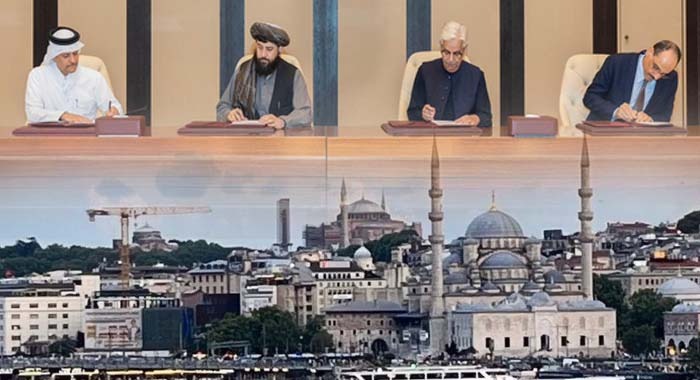Pakistan and the Taliban have blamed each other for the failure of three days of talks in Istanbul that were meant to secure a long-term ceasefire and reduce cross-border tensions.
Taliban-run national television reported on Tuesday that “certain circles within the Pakistani army” were obstructing the negotiations. The broadcaster, quoting Taliban officials, claimed that the administration “cannot prevent attacks inside Pakistan.”
The Taliban-controlled outlet went further, accusing the Pakistani delegation of “incompetence” and alleging that its members “retreat from the negotiating table instead of presenting arguments.”
Afghan and foreign media later confirmed that the Istanbul talks had ended “without result.” A Pakistani security source also acknowledged that the discussions concluded without an agreement. Neither Islamabad nor the Taliban administration has issued an official statement on the outcome.
Throughout the three days, both sides repeatedly traded accusations over the breakdown of the process. The Pakistani delegation reportedly reiterated its long-standing demand that the Afghan Taliban act decisively against the Tehreek-e-Taliban Pakistan (TTP), which Islamabad blames for orchestrating attacks from Afghan territory.
In its latest broadcast, Taliban-run television restated Kabul’s position that Afghanistan “cannot prevent attacks in Pakistan or represent the TTP.” The broadcaster echoed the Taliban’s usual line that the TTP issue is “Pakistan’s internal matter” and that Afghan soil “will not be used against any other country.”
Behind the Blame Game: Who Really Bears the Burden?
The Taliban’s latest narrative once again exposes their duplicity and persistent denial of responsibility for escalating cross-border militancy. Their claim of being unable to restrain the TTP contradicts evidence from within Afghanistan, where the group’s leadership operates openly and with impunity.
The latest example came at a time when peace talks between the two countries were underway in Istanbul. A condolence ceremony for an Afghan national affiliated with the outlawed Tehreek-e-Taliban Pakistan, also known as Fitna al-Khawarij, was held in France after he was killed during a Pakistani security operation in Bajaur earlier this month.
According to official sources, on October 19, four TTP militants were killed in an intelligence-based operation by Pakistani forces in Bajaur. Among them was Mulla Sadam alias Huzaifa, son of Abdul Baqi, a resident of Police District 3, Kunduz province, Afghanistan. His first condolence ceremony took place at Jamia Masjid Khama Kari in Kunduz on October 24, followed by another at Masjid Attaqwa in Rennes, France, on October 26, attended by a large number of Afghans.
Security officials confirmed that Sadam had been part of a network of Afghan nationals actively participating in TTP operations inside Pakistan. The fact that such individuals are publicly honoured abroad after fighting against Pakistani forces has once again underscored the Taliban’s duplicity and the cross-border nature of militancy emanating from Afghanistan.
For Pakistan, this isn’t a question of convenience but of verifiable facts. A surge in deadly TTP attacks, including those targeting security forces and civilians, reflects a clear pattern of coordination, training, and logistical support stemming from Afghan sanctuaries.
The Taliban’s refusal to act, or even acknowledge the problem, has reinforced suspicions that Kabul is serving the strategic interests of others; openly India, and quietly a powerful global actor with its own stakes in the region.
By shielding banned outfits and dismissing legitimate security concerns, the Taliban risk isolating Afghanistan once again and undoing whatever diplomatic ground they had gained since their return to power. Their posture not only deepens Pakistan’s security dilemma but also raises alarms about Afghanistan’s role as a breeding ground for non-state actors from around the world.
In this blame game, the evidence points one way. Pakistan’s complaints rest on a trail of attacks and intelligence reports, while the Taliban’s denials rest on empty claims. The Istanbul talks did not just fail — they exposed, yet again, the Taliban’s unwillingness to confront the very forces threatening both regional and global peace.





